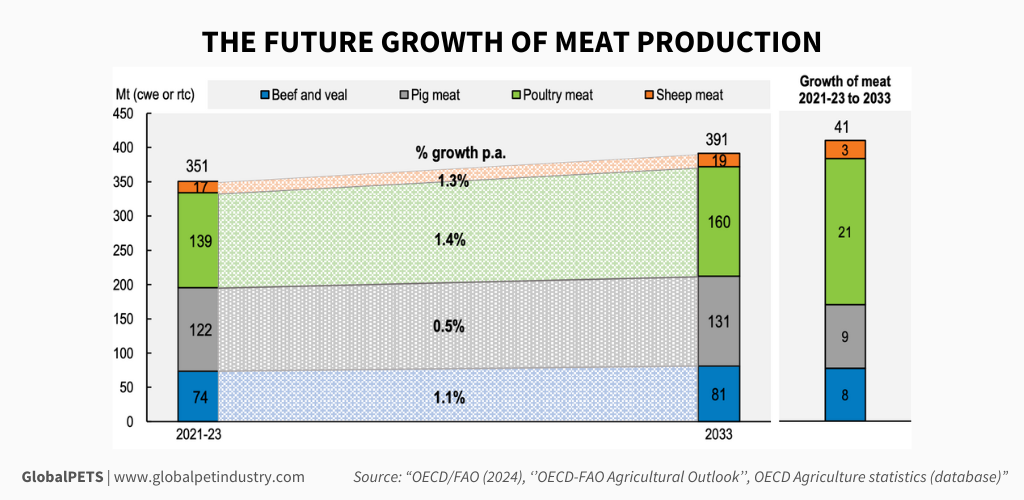Can pet food adjust to protein shortages and rising sustainability concerns?

Discover the core of these challenges and a possible solution.
The pet food industry is actively exploring new ingredients to diversify its portfolio.
Beyond traditional meat and plant-based by-products, the pet food industry wants to secure access to safe, nutritious, palatable and eco-friendly proteins to meet future demand.
Innovative technologies are emerging, including algae products, insect proteins, cultivated meat, precision fermentation and single-cell proteins.
But how can we differentiate these new technologies? What is their relevance today? And are they safe and approved for use in pet food?
Finally, what is the functional benefit of using them?
The problem
What are the issues with the classic options for pets found on our supermarket shelves?
Granted, conventional proteins such as chicken, beef, and fish provide the essential nutrients your pet might need, but unfortunately, their production has significant environmental impacts, something modern pet owners aren’t willing to compromise on.
In fact, it has been reported that animal protein is in more than 93% of pet food products worldwide, according to the Vegan Pet food Market Share and Size 2023 report from The Insight Partners.
In addition, the future growth of meat production, which provides the essential by-products for pet food is uncertain. According to the OECD, meat production is only projected to grow at an annual rate of 1%.
These global growth rates will vary regionally, with expected less growth in developed countries, and more growth in new economies.
Forecasts indicate that the pet food industry will grow at an annual rate of 4.5% in volume, surpassing the meat industry’s growth in the same period.
This raises a critical question:
How will the pet food industry secure sufficient access to proteins, when traditional sourcing is unlikely to keep up with the demand of the pet food industry?
How can the sector ensure access to proteins that provide good nutrition, promote pet health and have high acceptance by both dogs and cats?
And there is more…
We’ve seen a growing interest in pet food products that use less water, which reflects the broader issue of water scarcity, an issue that has gained prominence in recent years due to global and European heatwaves, droughts and wildfires.
Mintel’s 2023 Global Food & Drink Trends report, The Worth of Water, forecasts increased scrutiny of products with high water demands. This is particularly relevant to the pet food sector, which is responsible for 20% of global meat and fish consumption.
And according to Mintel’s Pet Food 2023 report, pet owners under the age of 35 show a particularly strong interest in sustainable practices, and three in five pet owners find products which use less water in production appealing.
If these views are maintained as this demographic gets older, it is likely sustainability-focused requirements in pet food will continue to grow in importance, driving long-term shifts in the pet owner market.
High greenhouse gas emissions, water usage, and land degradation are just some of the issues aligned with the production of these traditional pet foods, but there is another way that doesn’t compromise on taste, protein or environmental impact.
How to overcome these challenges?
The pet food industry has mastered the use of by-products from the meat industry over the past decades. By-products in the value allocation do not only bring a low carbon footprint, but also fulfil the ethical and moral obligation to utilize all parts of harvested animals.
Given all the challenges, the pet food industry should explore the inclusion of new sources, not as replacements, but as additional tools for building and creating healthy, nutritious and appetizing pet diets.
In recent years we have seen already, a strong growth of insect proteins in pet food. Now, fermentation technology gaining traction. A number of developments are underway, while cultivated meat and precision fermentation are still in the early stages, only very few have achieved scalable production, price parity and regulatory approval, thus bringing new options to the table.
The power of fermentation
A high-quality protein ingredient created by fermentation called FeedKind Pet® produced by Calysta has been granted regulatory approval for pet food and is readily available to pet food manufacturers today.
Through Calysta’s patented fermentation technology, we can now make high quality protein for pet food without using plant or animal products. It also uses very little water making FeedKind Pet the first high-quality and scalable fermented protein now available in commercial quantities.
It is vegan and at the same time nutrient-dense with a strong amino acid profile, so it’s perfect for health-conscious pet parents. The best part is, we’re continuously fermenting at our facility in Chongqing China, so we can guarantee reliability in supply, providing a high-quality protein every time to meet increasing demand by pet food manufacturers.
It also features postbiotic properties that support gut health, which we know is an important factor for pet owners worldwide. A survey of pet owners in the UK, Canada, France, and the US found that postbiotics are the most popular ingredient, with 63% of pet owners likely to purchase pet food products that include them. Most importantly, it is tasty.
Innovation is key
We must prepare for the demands of the future and that’s exactly what we’re doing here at Calysta by embracing transparency in sourcing and using a more sustainable production method via fermentation.
FeedKind Pet has already gained approval in the EU, the UK, Canada and many other countries, marking a significant step towards more sustainable pet food solutions.
This shift towards alternative ingredients in pet food reflects the broader trends we’re seeing in human nutrition, where sustainability, health, and ethical considerations are transforming consumer choices.
Concerns are emerging within the pet food industry about the long-term availability and reliability of animal protein ingredients, as well as their water usage in production.
As we look to the future, we can guarantee alternative protein ingredients like FeedKind Pet will play a critical role in creating a more sustainable and innovative pet food industry.

